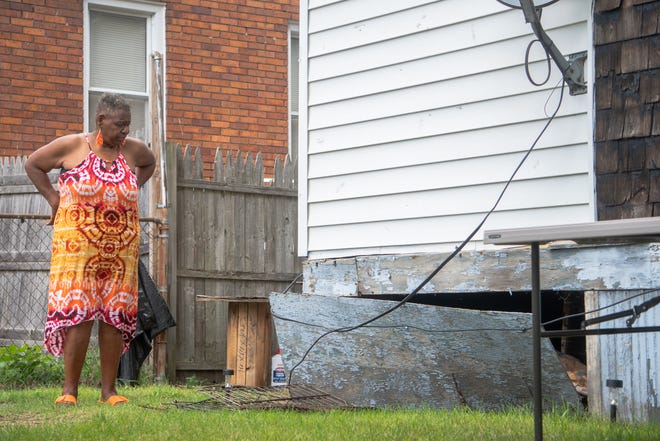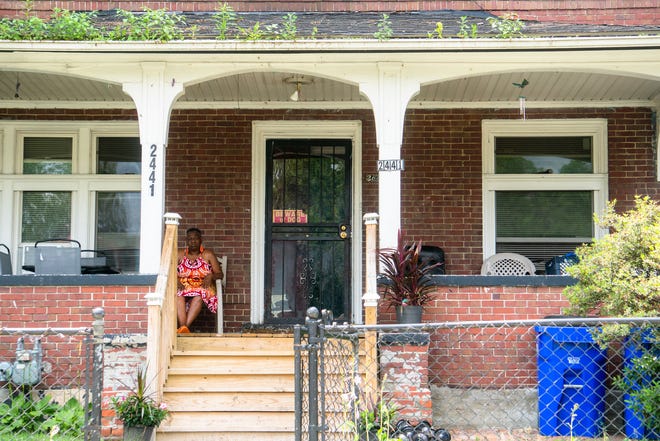
More than 4,800 Detroiters have applied for a new roof repair program that can accommodate 1,000 homes, demonstrating the vast need for home repairs across the city.
City officials expect as many as 10,000 applications by month’s end, when the application window for the roof repair program closes.
The city of Detroit earlier this month announced a program to replace 1,000 roofs next year for low-income seniors and homeowners with disabilities. The $30 million program, dubbed Renew Detroit, is the first initiative to come out of more than $400 million in federal COVID-19 recovery dollars the city received.
The roof repairs are expected to cost $20 million, with each project estimated to cost between $7,000 and $13,000. The city plans to spend the remaining $10 million allocated to the program on repairs to at least an additional 500 homes but has yet to decide what types of home repairs that money will fund.
“We know that home repair need is great in the city and I think this program is specifically structured to try and speak to that,” said Heather Zygmontowicz, chief of special housing programs. “Our prior estimates of annual numbers of home repairs coming out of the city are usually anywhere between 100 and 300 a year. This program is looking to significantly increase that.”
Home repairs were among the top issues Detroiters raised when asked how they would like their city government to spend federal dollars. Researchers and community leaders have said the breadth of repair needs in Detroit are vast and available programs are difficult to tap into or have long wait lists.
Daisy Jackson, vice president of the Field Street Block Club in Detroit’s Islandview neighborhood, said that $30 million is not nearly enough to address the need for home repairs and that it shouldn’t be restricted to seniors and those with disabilities.
Jackson, a fourth-generation Detroiter who has lived in her Islandview home for 50 years, said roof repairs are a top priority in her neighborhood.
“People have leaks coming in their house. When it rains, the animals get in their homes, get in their attics and everything,” Jackson, 66, said.

Roofs are key to safe homes.
“We associate stable housing with having a roof over our heads and we know that in Detroit, for thousands of Black homeowners with fixed incomes or historically low incomes, this just is not a reality,” said Alexa Eisenberg, a postdoctoral research fellow with the Poverty Solutions initiative at the University of Michigan.
More:New home repair program aims to replace 1,000 roofs for low-income Detroiters
More:Detroiters want to fix up their homes. The path to do that isn’t easy.
There were more than 24,000 moderately or severely inadequate homes in Detroit, according to a 2020 University of Michigan study, which analyzed 2017 American Housing Survey data. These could be homes with broken toilets, no working cooking equipment, rats in the unit, exposed wiring and water leaks.
“Focusing on roof repairs is critical in part because the need is so widespread, in part because the work is so financially burdensome for homeowners to take on themselves, and in part because roofing constitutes such a baseline need for addressing other threats to safety and health in the home,” said Eisenberg, who co-authored a separate U-M report.
Eisenberg’s report found roofing to be the most common need in 2019 among participants of a home repair program by the United Community Housing Coalition and partners, which provided emergency grants and homeowner education.
As of midday Monday, 4,848 people applied to the city’s repair program, which receives a couple hundred applications a day on average. The city expects anywhere from 7,000 to 10,000 applications to roll in by the Oct. 31 application deadline.
To qualify, residents must be 62 or older or a homeowner of any age with a disability, approved for the Homeowner Property Exemption (HOPE) — which exempts low-income homeowners from property taxes — and have not received a city home repair grant of $10,000 or more in the past decade.
After that, residents will be chosen based on how long they’ve owned their home, their level of poverty exemption (meaning the lower their income, the higher their priority), the number of people in the house, and whether they are already on a wait list for home repairs or weatherization.
At this time, it’s unclear how many applicants meet the three initial criteria, Zygmontowicz said. However, approximately 40% of people are reporting that they have already been approved for the property tax exemption or have applied.
“We know that that’s like the hardest thing for them to achieve,” she said. The city is urging homeowners to apply for the property tax exemption and is hosting several drive-thru events for application help, along with nonprofit partners.
This year, the city has received 1,624 property tax exemption applications and had approved 1,281 as of Thursday. Applicants approved in 2019 and 2020 will also receive an exemption in 2021 because of changes in state law last year.
Detroiters must submit their property tax exemption applications by Nov. 12 and must be approved by Dec. 14 to be eligible for the repair program.
Josh Elling, CEO of Jefferson East Inc., said he’s happy to see the city directing money toward the issue of home repairs and commended the design of the program.
Elling said he wouldn’t be surprised if the city’s roof repair program received 20,000 or more applications. At least 40% of the 3,000 homes in the Jefferson-Chalmers neighborhood needed some form of roof repair according to an assessment his nonprofit conducted a few years ago, he said.
“We estimated that out to be about $2.87 million in roof repair need just in one neighborhood, so sort of multiply that across the city and you can see the need is absolutely enormous,” he said.
Having a damaged roof can stand in the way of accessing other types of repair grants. The city has said that 50% of Detroiters are denied home weatherization grants because of bad roofs.
“If we can tackle roofs, that’s going to uncork a whole lot of other sort of federal money around weatherization to make homes, healthy, safe and secure for residents,” Elling said.

Jackson’s block club set up an online fundraiser to raise money for home repairs, which already helped one neighbor with their roof, she said.
“We can only do so much,” she said.
Jackson was part of a group of about 90 people who briefly shut down Woodward Avenue at Grand Circus Park on Oct. 8 protesting the way the city of Detroit plans to spend its American Rescue Plan Act dollars, Bridge Detroit reported. Many protestors wanted more money to go toward home repairs.
Roof repairs are slated to begin in spring 2022. The next phase of the program will include at least 500 homes, although the type of repairs hasn’t been determined. This phase could focus on electrical or plumbing work.
“The No. 1 thing that we’re trying to achieve are 1,500 home repairs that are done well, that make Detroiters more stable in their home, especially longtime Detroiters,” Zygmontowicz said. “The immediate next goal is, can we secure additional funding because we did so well executing this round of funding.”
For more information, go to www.detroitmi.gov/RenewDetroit. Applications can be filled out online or over the phone at 313-244-0274 between 9 a.m. and 6 p.m. Monday through Saturday.
Nushrat Rahman covers issues related to economic mobility for the Detroit Free Press and Bridge Detroit as a corps member with Report for America, an initiative of The GroundTruth Project. Make a tax-deductible contribution to support her work at bit.ly/freepRFA.
Contact Nushrat: nrahman@freepress.com; 313-348-7558. Follow her on Twitter: @NushratR. Sign up for Bridge Detroit’s newsletter. Become a Free Press subscriber.
New Detroit repair program can fix 1,000 roofs. Nearly 5,000 applied
